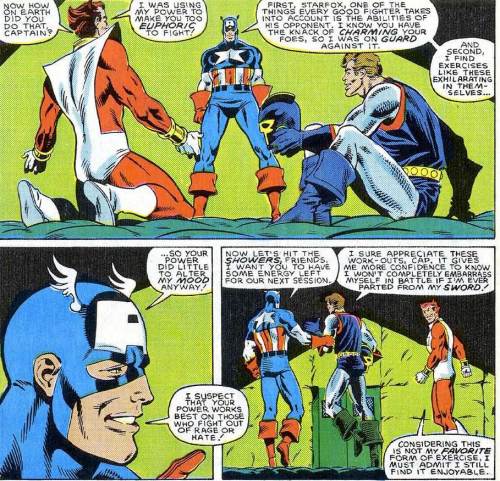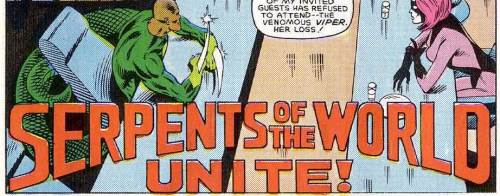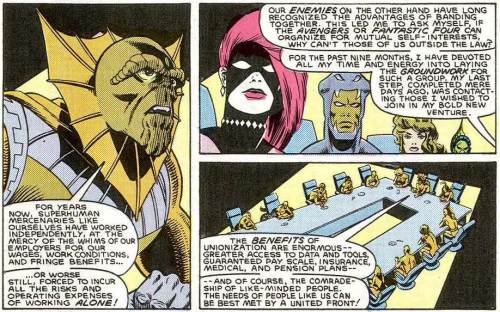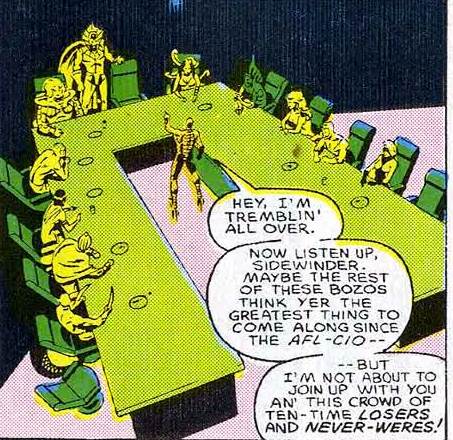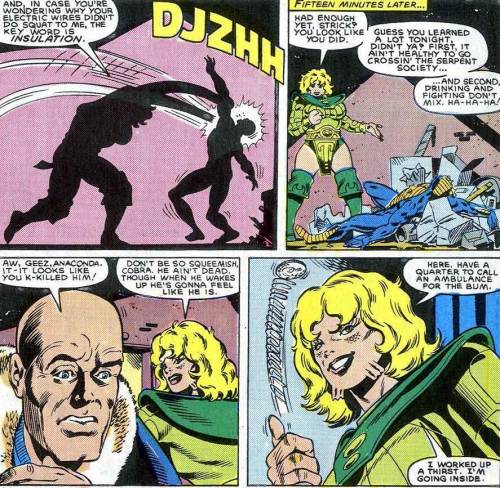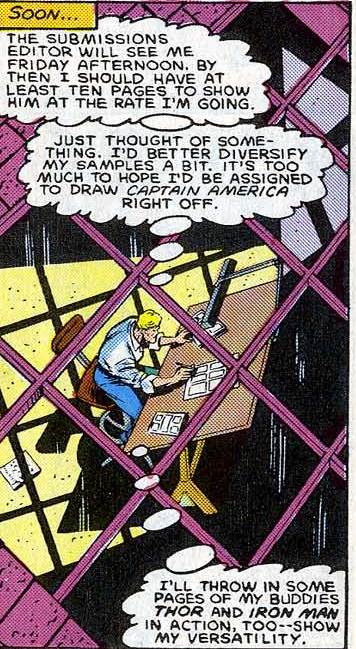Hello gentle readers! Ready for another walk through the (Gruen)wald?
This issue ushers in the post-Nomad era, establishing the kinds of storytelling rhythms that will characterize Gruenwald’s Captain America for years to come.
We begin with an Avengers combat-training workout, with old pro Cap teaching a swordless Black Knight and the dilettantish space-Eternal Starfox a thing or two about unarmed combat. This scene (which takes up four pages of the book) might seem like mere filler, but Gruenwald is in no hurry to rush his storylines (which, from here on out, will almost always spill over from issue to issue) and the friendly skirmish does create an opportunity for this rather startling exchange:
So Starfox (aka Eros) uses his pleasure power on Cap and it just gets him more in the mood for good-natured brawling? This little moment epitomizes Gruenwald’s uniquely Janus-faced contribution to the superhero landscape of the mid-1980s. On the surface, Cap’s meaning (when he says that he doesn’t fight “out of rage or hatred”) is crystal clear–and throughout the soon-to-emerge “Dark Age” of Wolverine/Punisher/Lobo/etc. Gruenwald (along with other favourites of mine like Grant Morrison–without question THE finest non-drawing creator in comics–and Roger Stern) will do his best to present a triumphantly humane alternative to the best-selling badassery that dominated the late 1980s and early 1990s (not only in Cap, but also in Quasar and DP7). But it doesn’t end there. The whole thesis of this blog is that there’s always something slightly subversive about Gruenwald’s classicism. This is most evident in things like Squadron Supreme and the Johnny Walker storyline (still a couple of years away at this point), but it was present in the inaugural Nomad/Madcap/Cap issues (which allow it to be blithely understood that there is no logical counterargument against nihilism), and it’s here too, in a very playful way…
To wit: isn’t Gruenwald basically saying that Cap gets off on fighting? Of course he is–it’s all right there in Eros’ remark that fighting isn’t HIS favourite form of exercise. There doesn’t have to be anything nasty about this. I think of Gru-Cap’s sexuality as kind of on a par with Moore & Gibbons’ Dan and Laurie, celebrating their bodies’ victory over that tenement fire in Watchmen #7 (which is another reason why, incidentally, Bernie Rosenthal–much as I like her–just isn’t going to fit into the writer’s long-term plans… at least not as a love interest).
But enough about love interests–he said slyly–let’s get on with issue #310’s main plot development:
Writer: Mark Gruenwald
Pencils: Paul Neary
Inks: Dennis Janke
Colors: Ken Feduniewicz
Letters: Diana Albers
Editor: Mike Carlin
Yes, for most of the next hundred issues or so, the eponymously uniting reptiles are basically going to share this book with its title character. Some of them more than others, of course. And they’ll have even more company within a couple of years. You might argue (especially if you’re Jason Powell) that this isn’t SO very different from some of the stuff that Chris Claremont did with the Hellfire Club in X-Men, but I’d have to disagree. Yes, both the Serpent Society and the Hellfire Club will play important ongoing supporting roles in their respective titles, but the HC are never seriously presented as audience surrogates for the reader–whereas I think it’s pretty clear, right off the bat, that the Serpents are more to be empathized with than despised. Despite their oft-impressive power sets and lack of respect for the law, these aren’t arch-villains, or classic superhero antagonists–these are just scared, put-upon, regular folks, banding together to stave off economic oblivion and other associated hazards of their profession in Reagan America.
Gruenwald makes it 100% explicit:
You might call it a stretch, but to me, by placing this kind of rhetoric in the fanged mouth of a “supervillain”, Gruenwald is offering a biting critique of the quasi-criminalization of unionization that began with Reagan’s crackdown upon the Air Traffic Controllers and has been proceeding apace (in both the U.S. and Canada) ever since. The point is driven home by bringing a dissenting voice into the inaugural meeting of the new organization–Constrictor’s:
Constrictor, in this story, is almost a textbook Popular Front “class traitor”. He has no use for class solidarity. He’s always gotten by fine–and he’s not about to let himself be dragged down by a bunch of “losers and never-weres”. Nevertheless, after he leaves the meeting in a huff–he quickly realizes that this new “guild” might be capable of wresting valuable contracts away from him. So he decides to go informer–and devotes himself, for the remainder of the issue, to the singularly distasteful project of having the Avengers clean up his problem for him. By this device, Gruenwald predisposes us to see events through the eyes of Anaconda, Cobra and the Rattler–despite the fact that they are about to run headlong into the book’s resident superhero (tipped off by Constrictor’s anonymous phone call to Avengers HQ). Throughout its years as part of Gruenwald’s Captain America mix, the Serpent Society–especially a certain purple-haired member–will become the book’s secret reservoir of humanity (and a good thing too, given that, as mentioned in earlier entries, Gruenwald’s Steve Rogers cannot–for structural/symbolic reasons–have much of a personality of his own).
After that, we get the expected fight between Cap and Anaconda (while her comrades make good their escape, with a valuable scientific item from the vaults of the Brand Corporation–Marvel’s ubiquitous biotech bete noire of 1980s), her inevitable defeat (although it’s touch and go for a while there) and her even more expected (because it’s in the Serpent Society’s workers’ rights charter) off-panel rescue by ace teleporter and local shop steward Sidewinder. Then she caps off the issue by dispensing this rousing bit of intra-serpent (criminal) “class justice”:
Serpent solidarity!
Ah, but before I go–all kinds of other stuff happened in this 22-page story! For one thing, Steve (you’ll recall he quit his last job as part of a principled stance against rampant American consumerism) decides, on a whim, that he’d like to apply his artistic talents to the creation of superhero comics:
I think the above panel speaks volumes about our hero. The proliferating thought-bubbles (organized entirely around matters of pure principle) threaten to completely obscure Bernie Rosenthal’s poignant going-out-of-business crisis. As a romantic partner in a modern relationship, Cap has some serious drawbacks. As this blog progresses, I’ll be trying to build a case for Gruenwald’s Cap (and even more for Gruenwald’s Captain America–the narrative, I mean) as an extremely canny political thinker–and not merely the naive “optimist” that many people (from across the political spectrum—but generally from the Right) would like the character to be. However, on the personal side of the equation, Steve is as hopeless a fount of “mind over matter” platitudes as you’re ever likely to find:
Anyway, it turns out that Marvel actually is interested in taking a look at Steve’s sketches, a fact that promises to add a little basic metatextual spice to future issues:
But I don’t think it’s gonna do much for Steve and Bernie’s relationship, do you?
Dave

